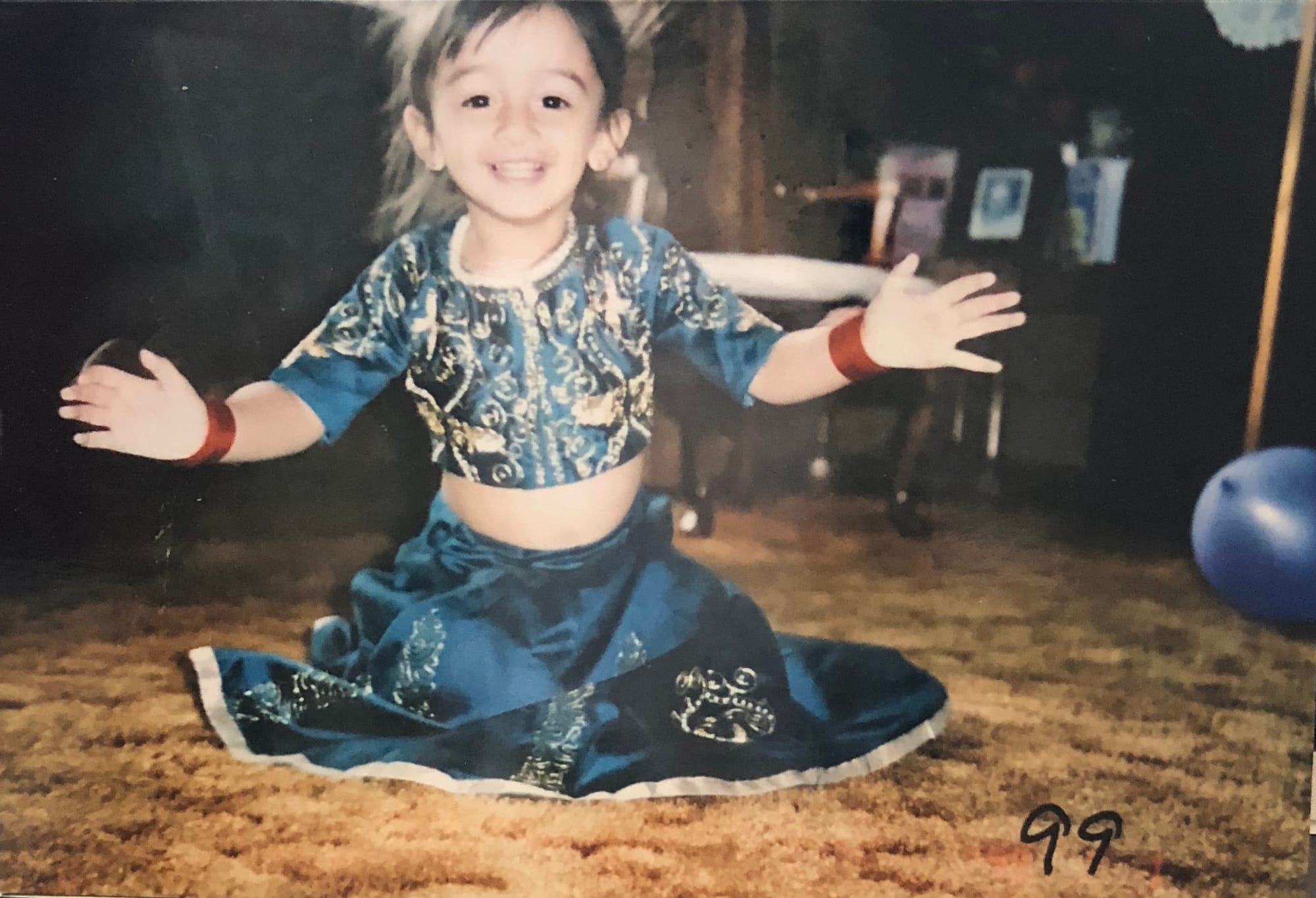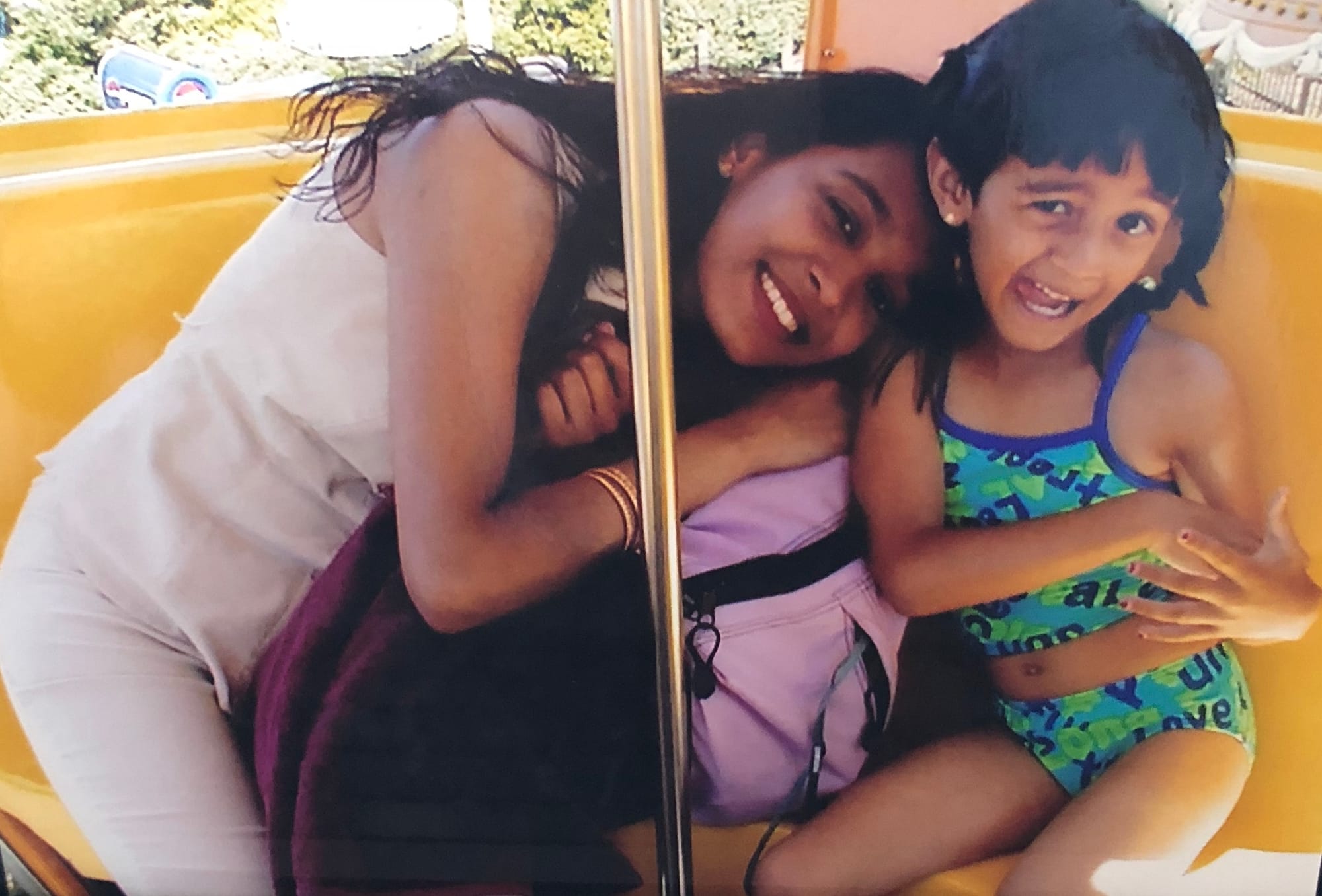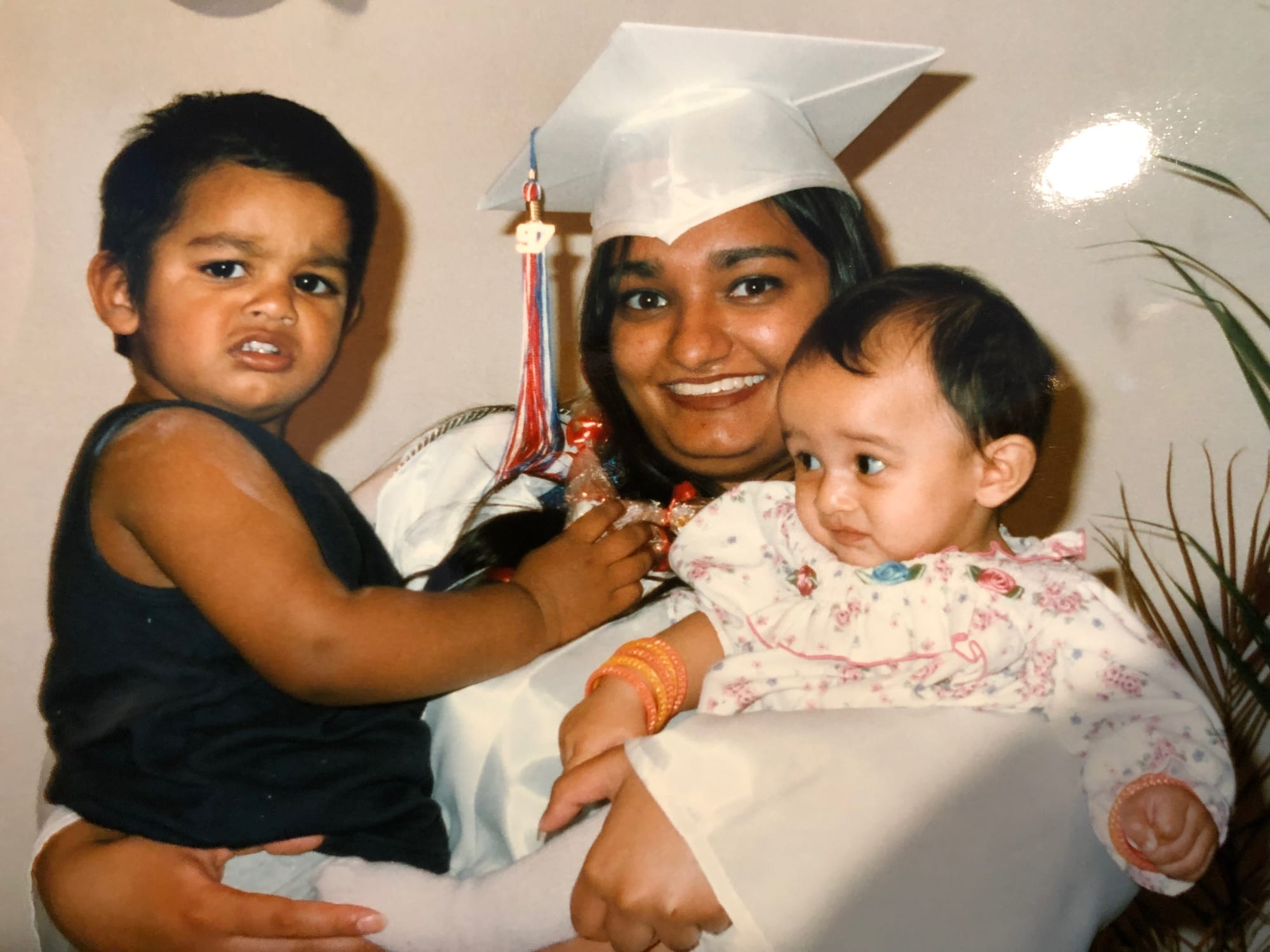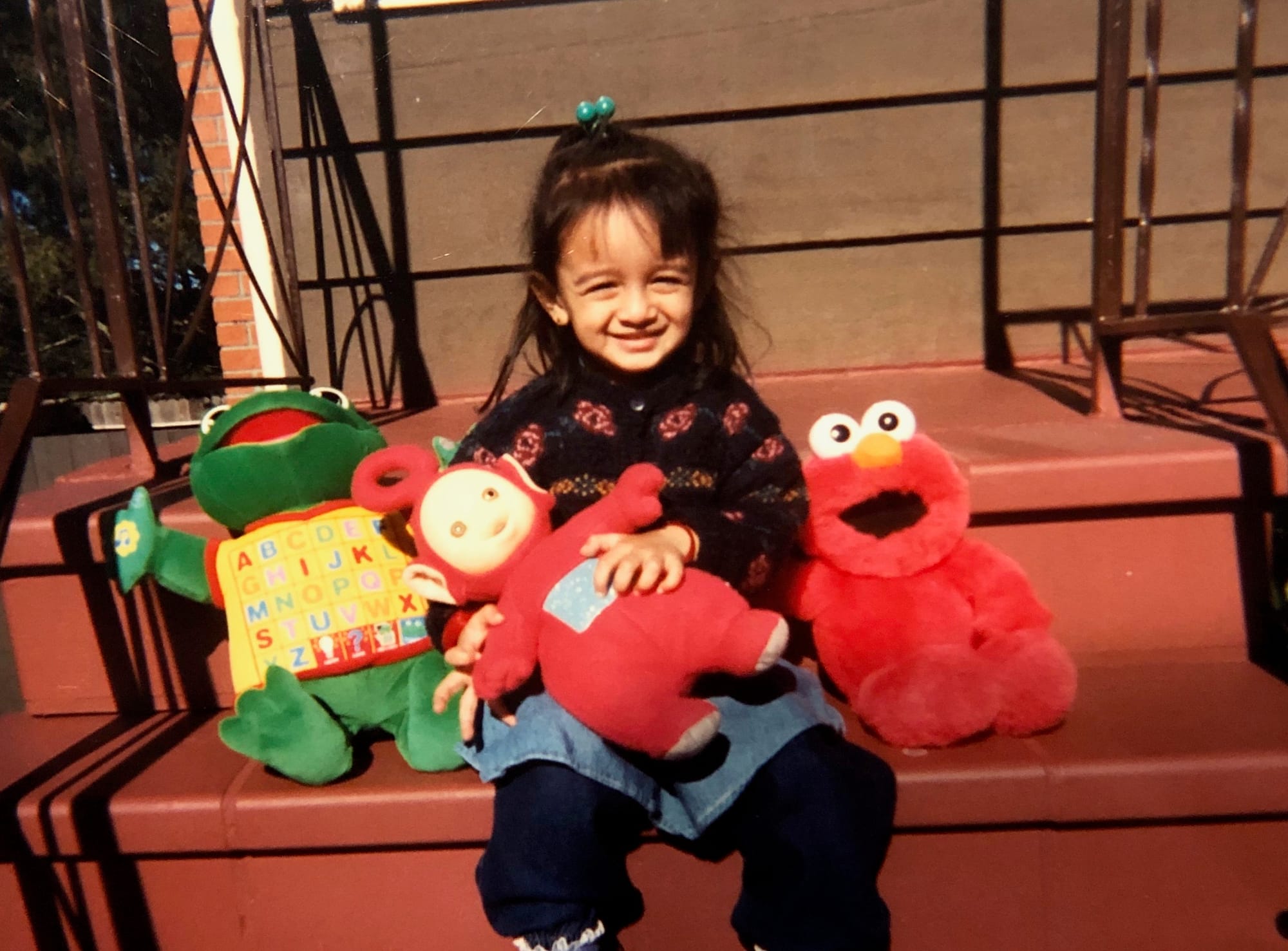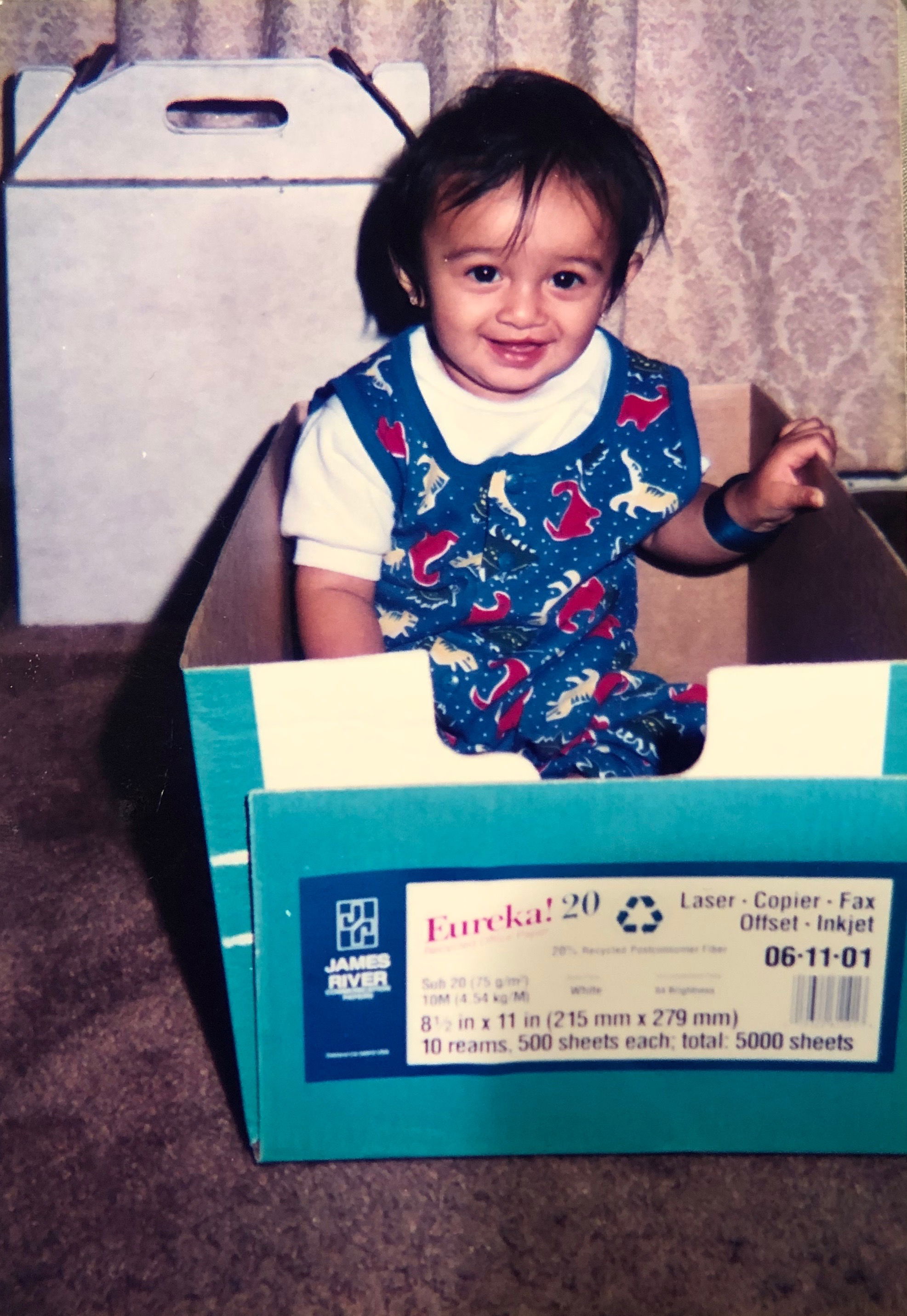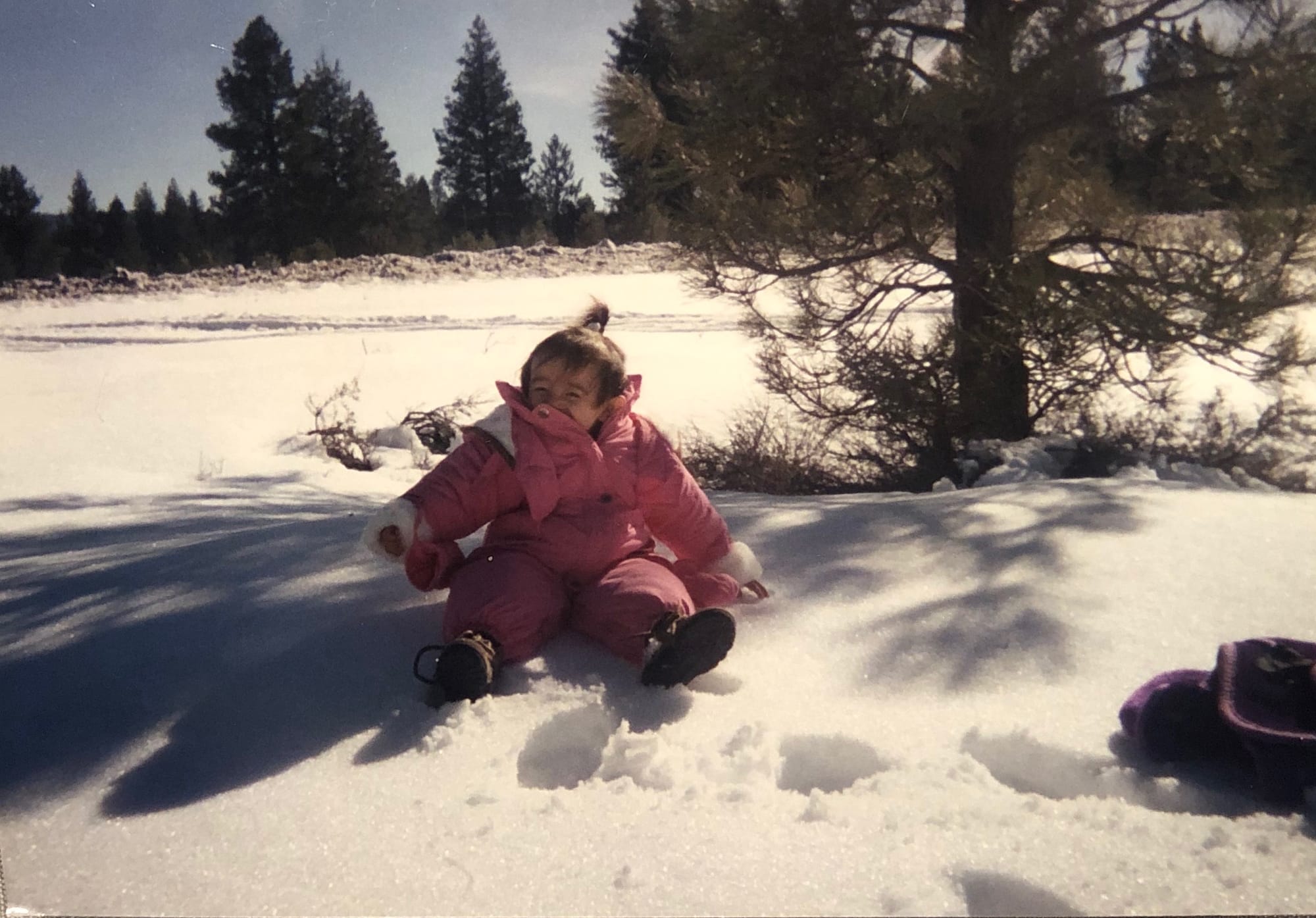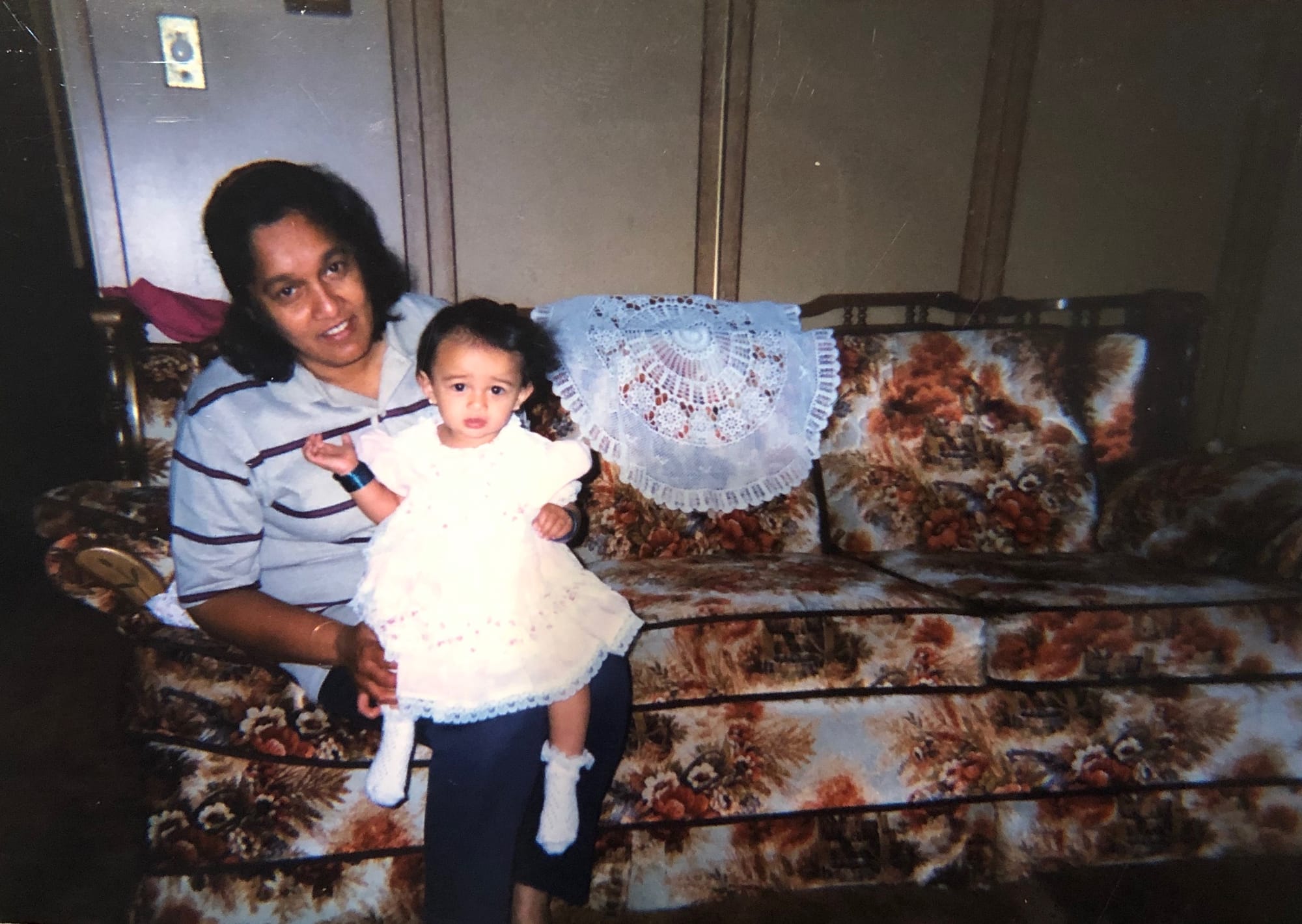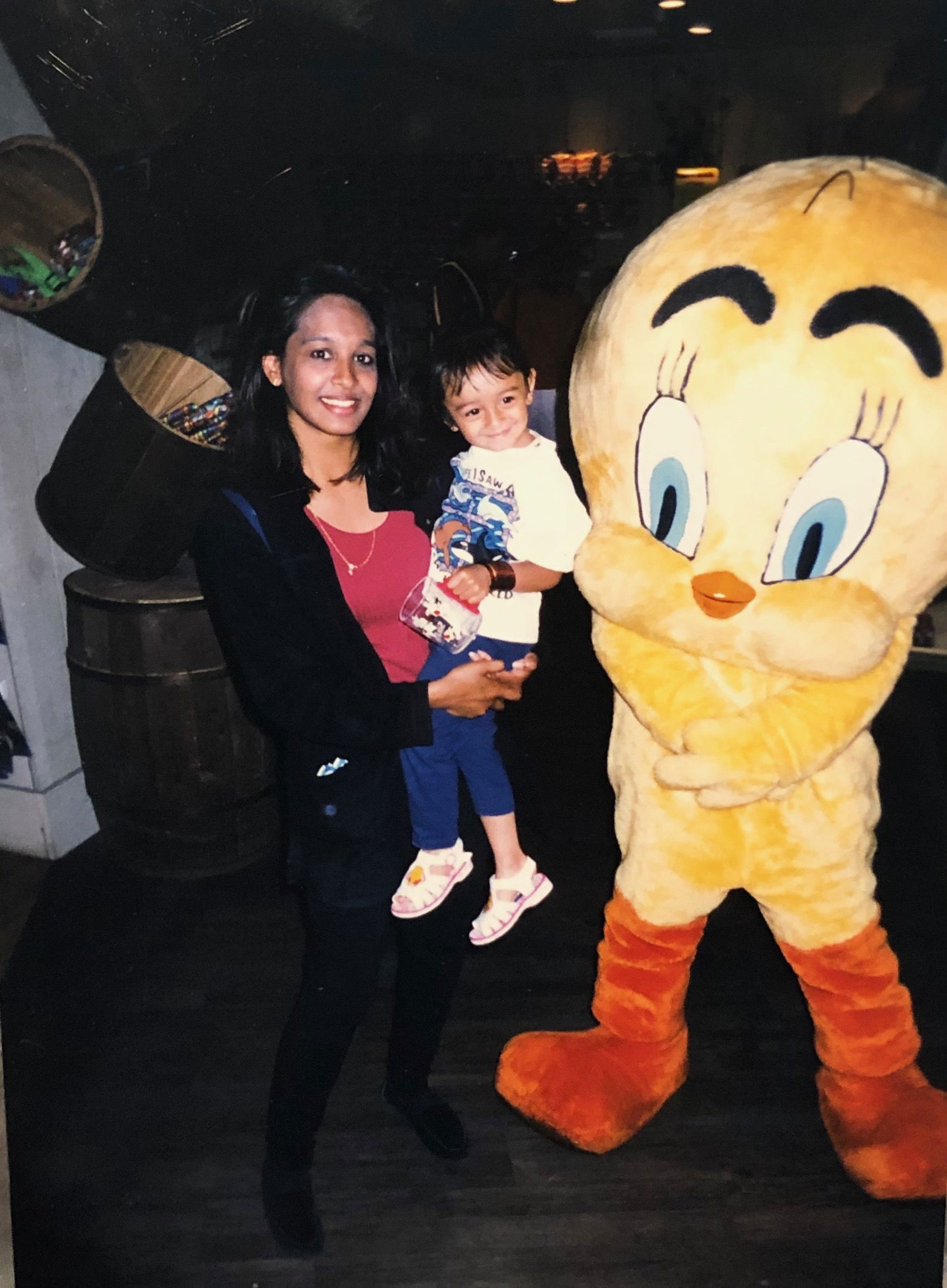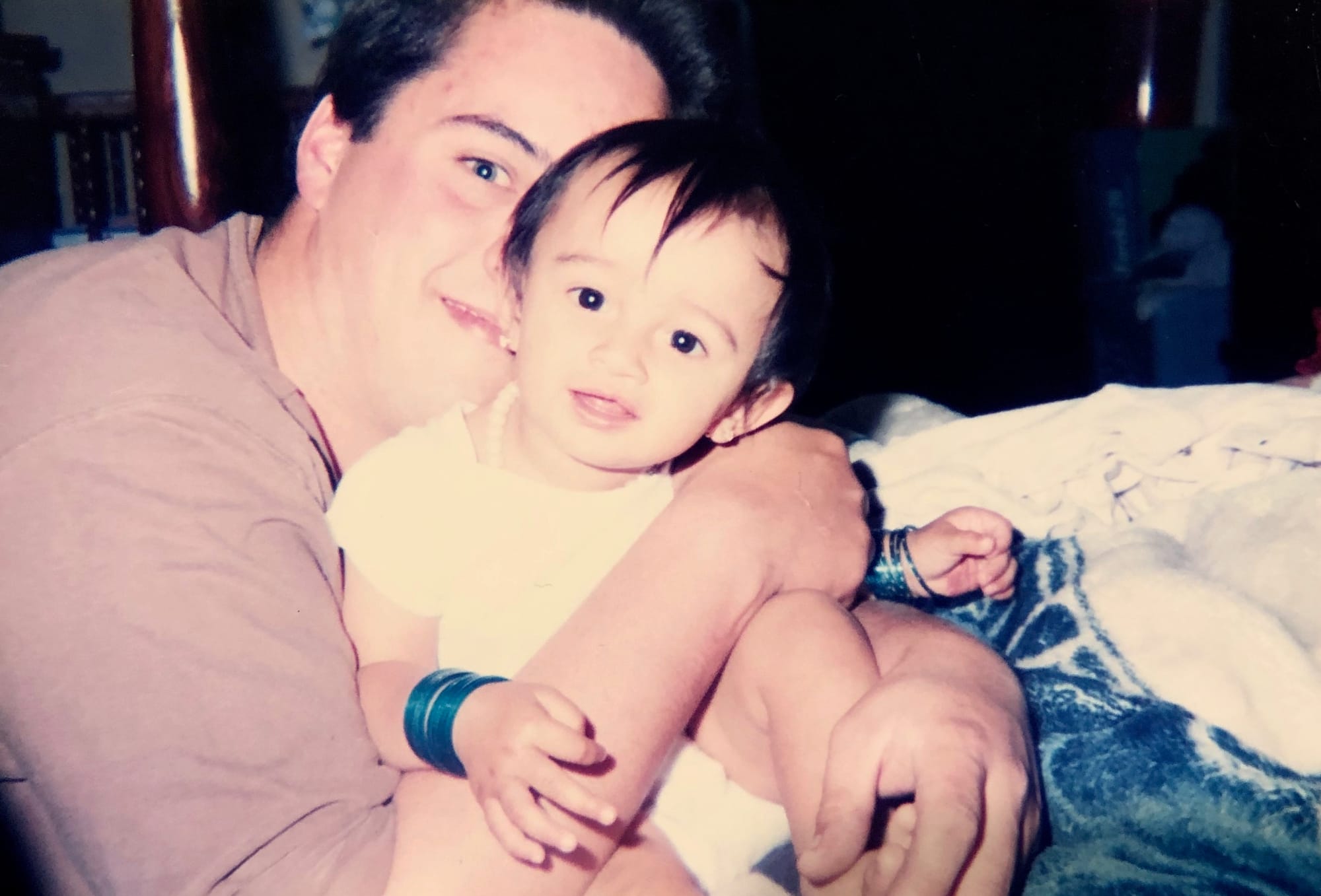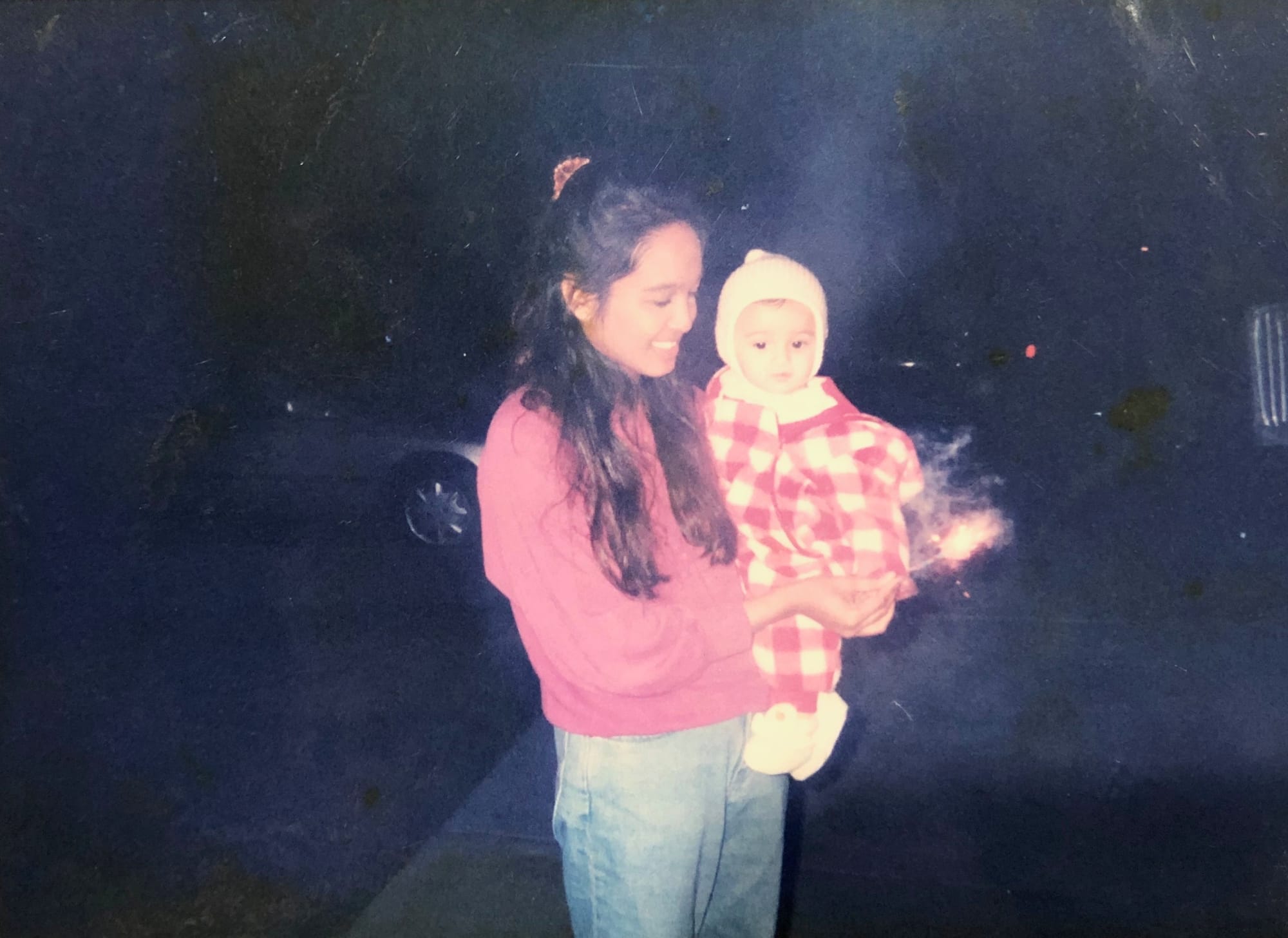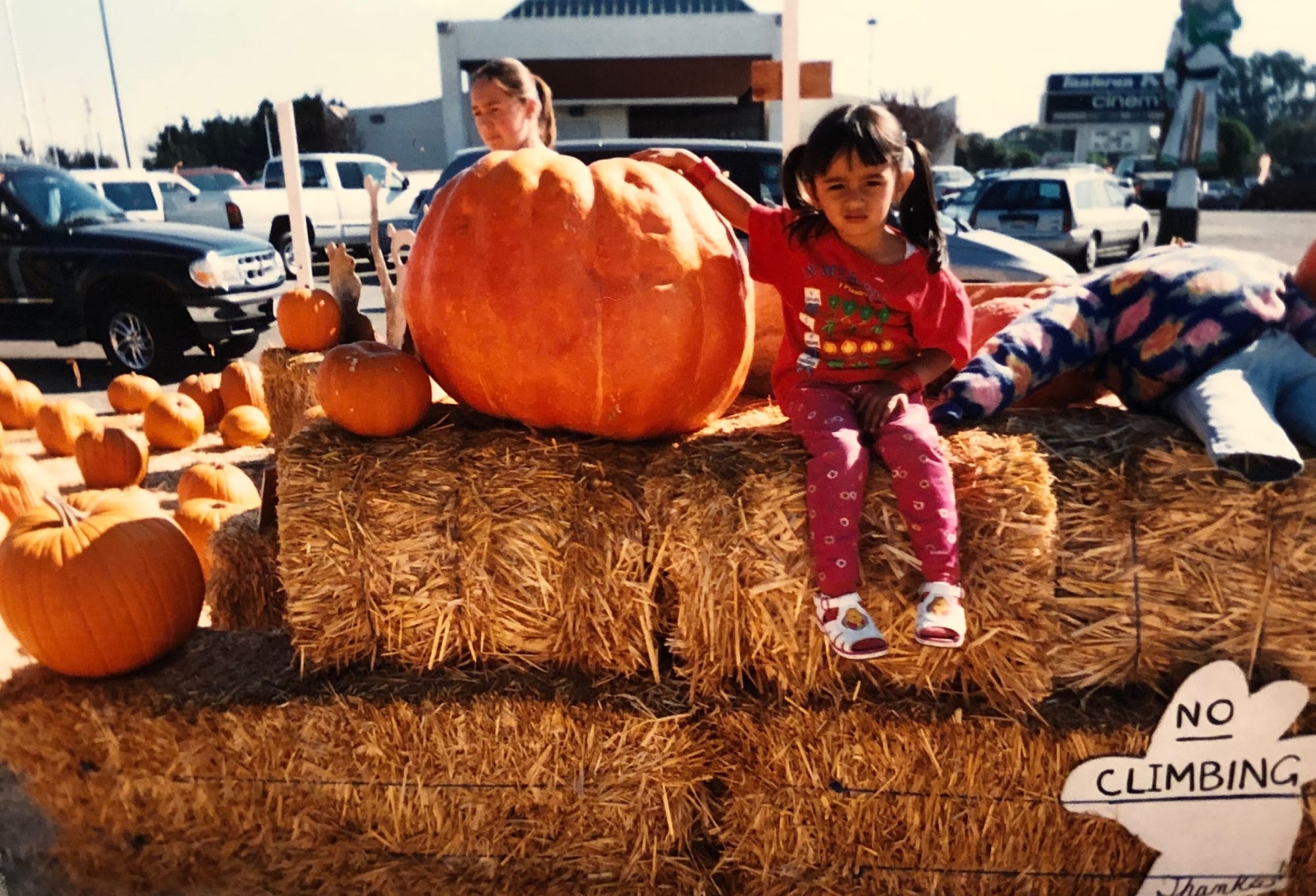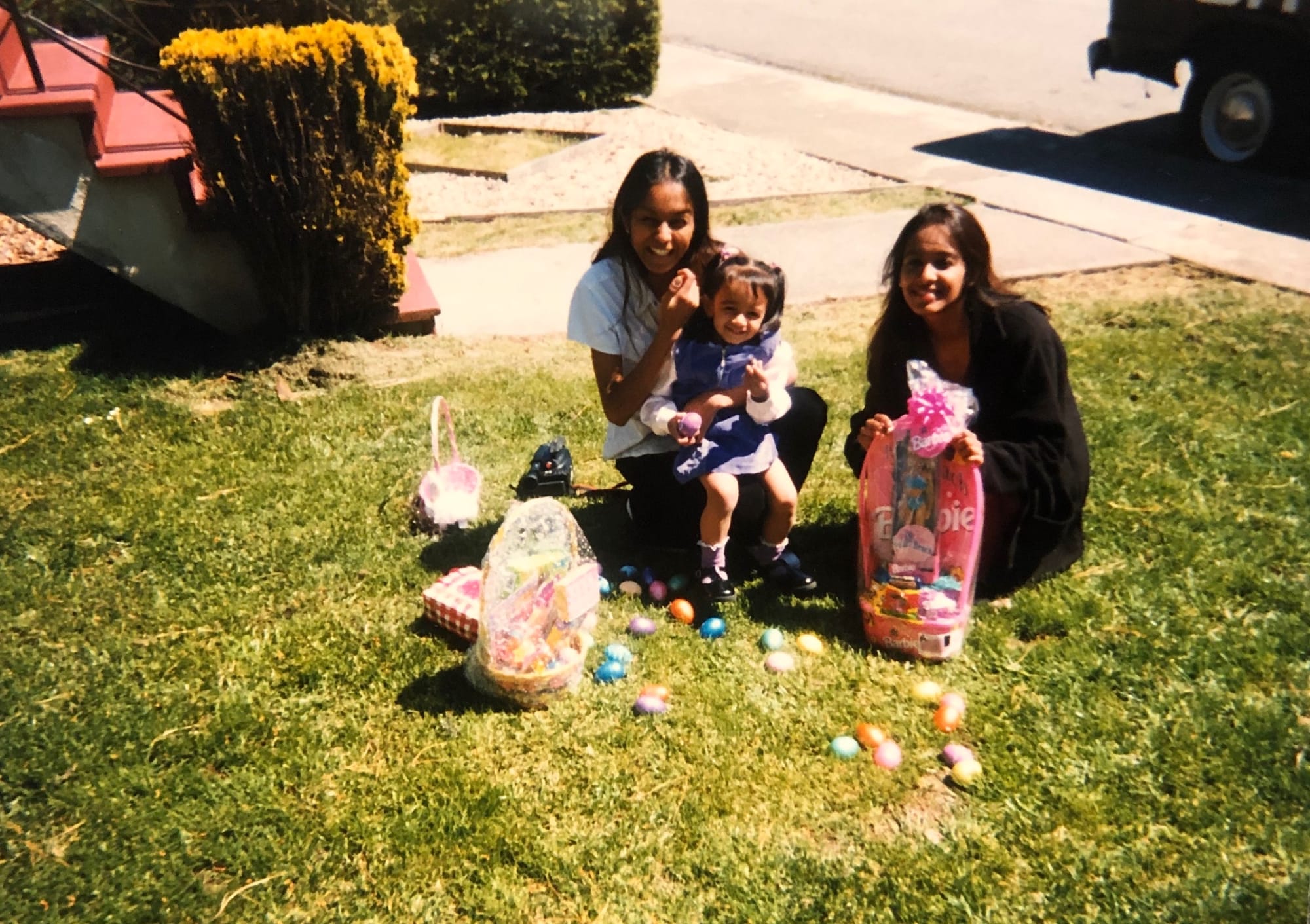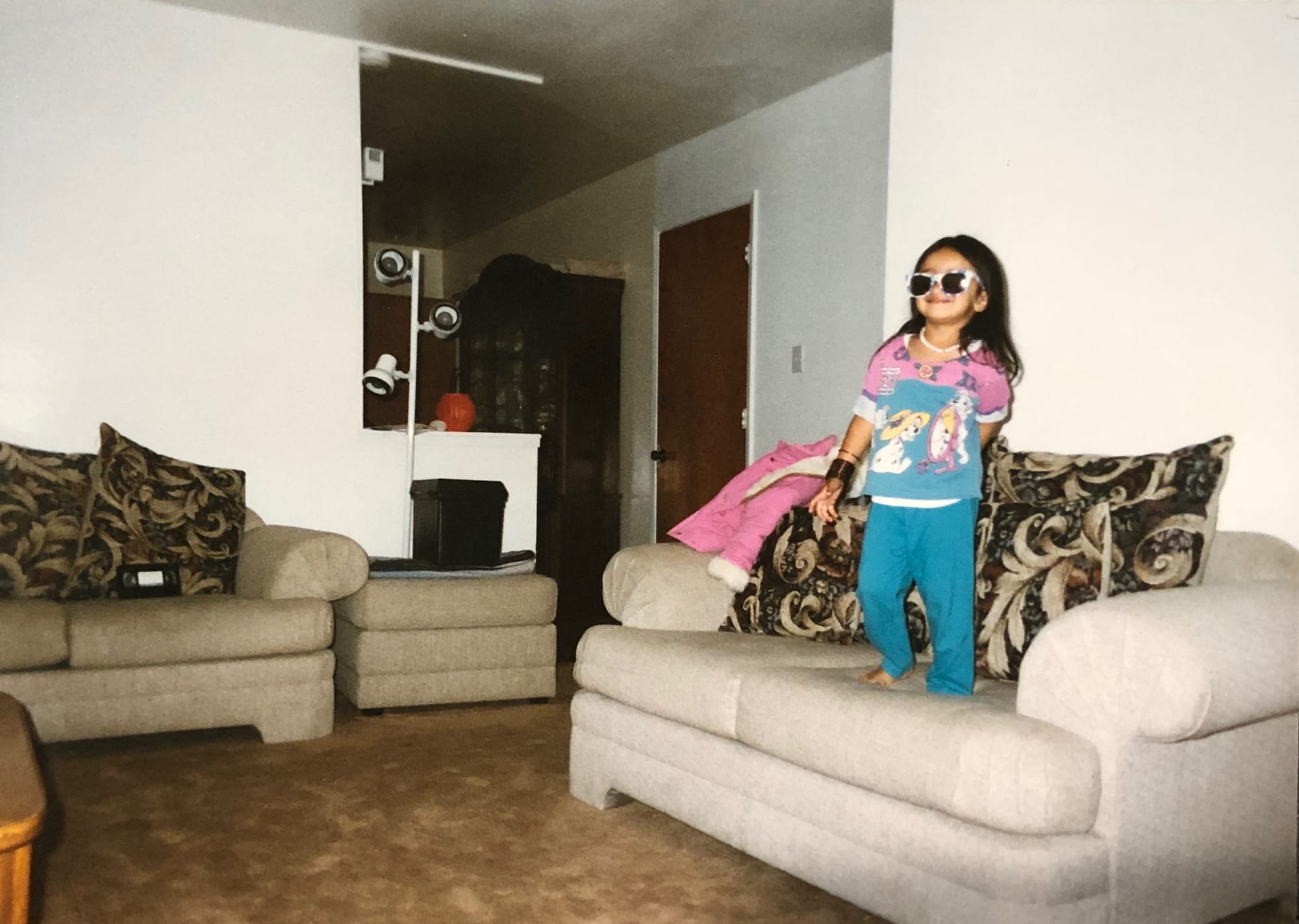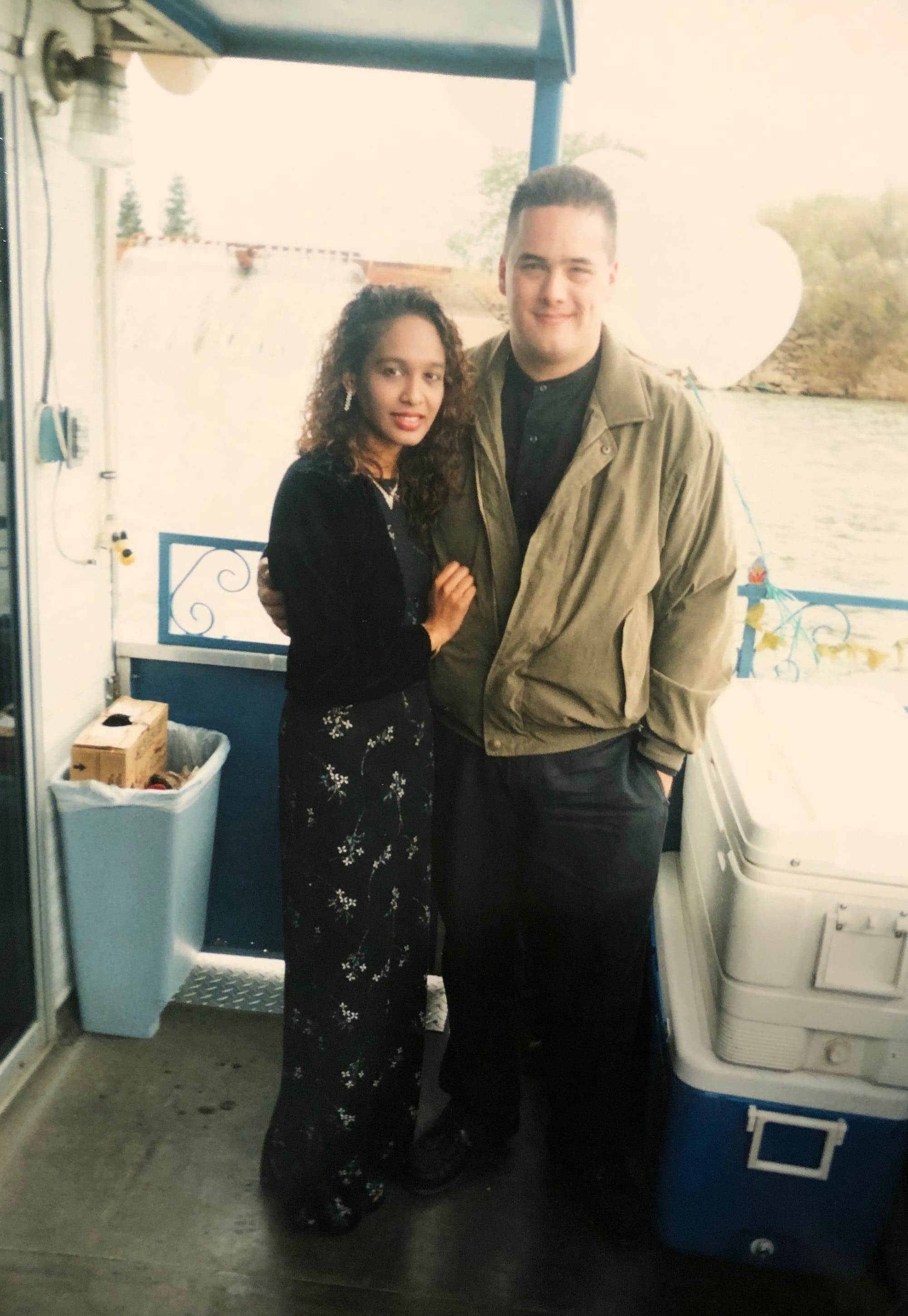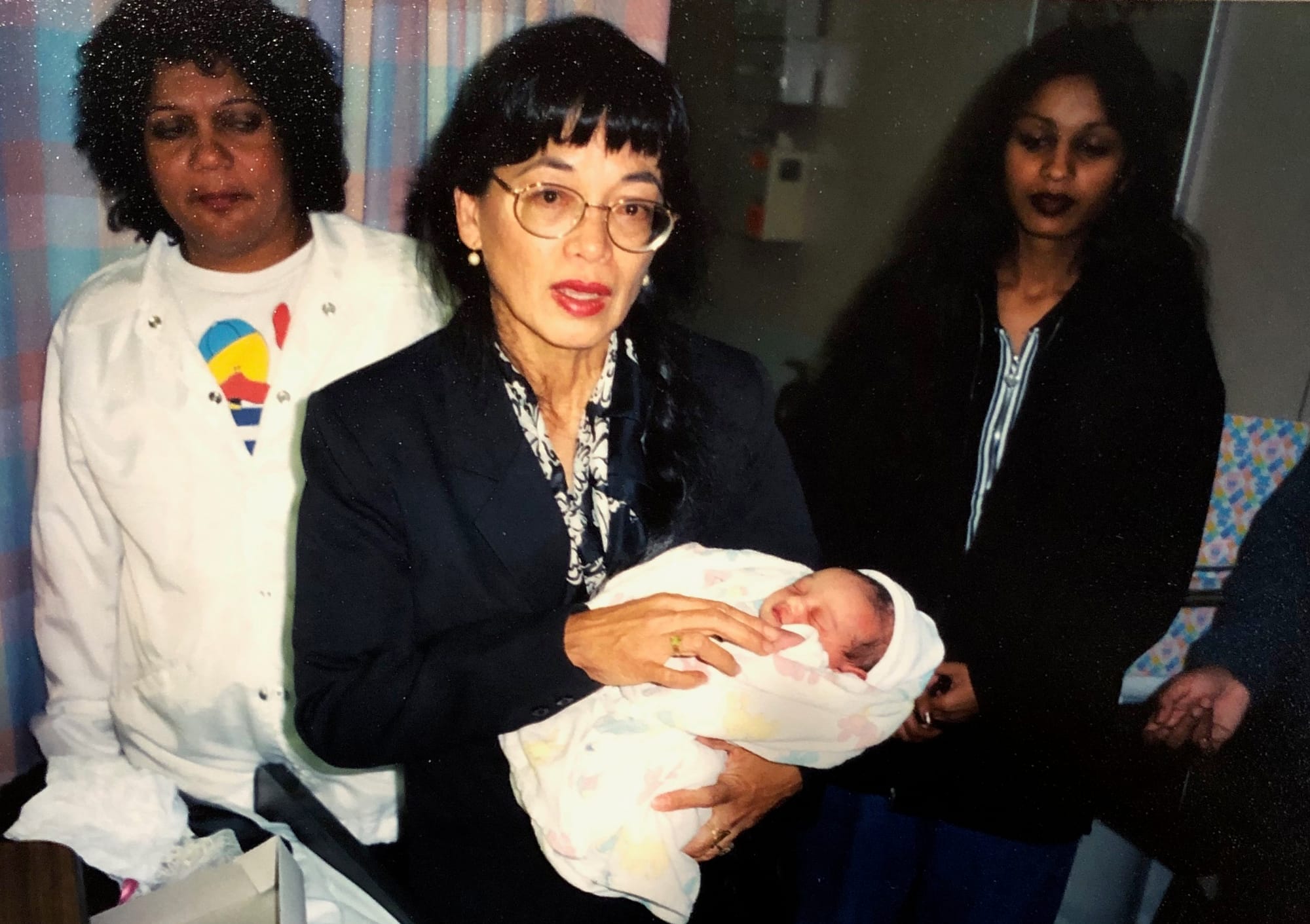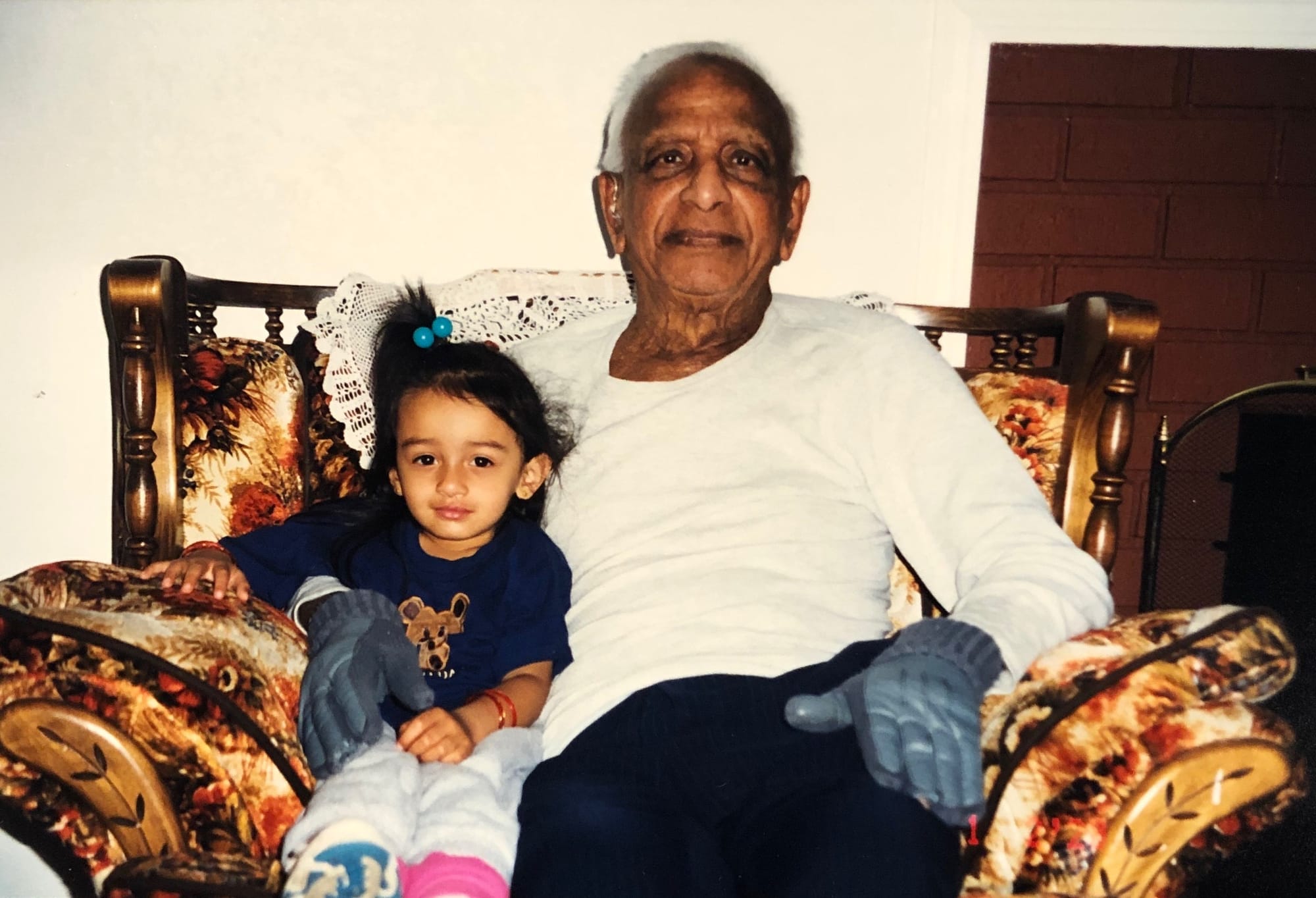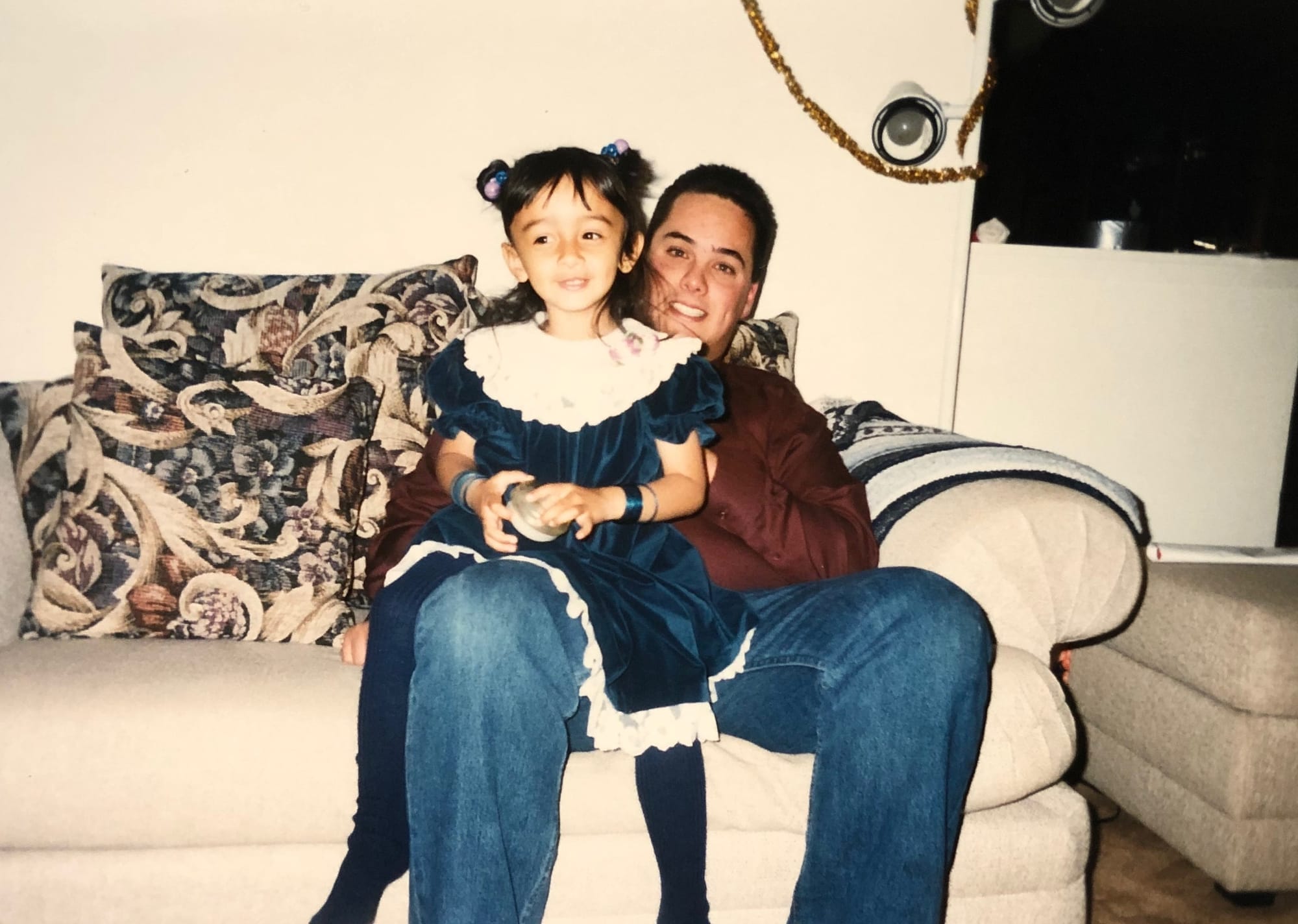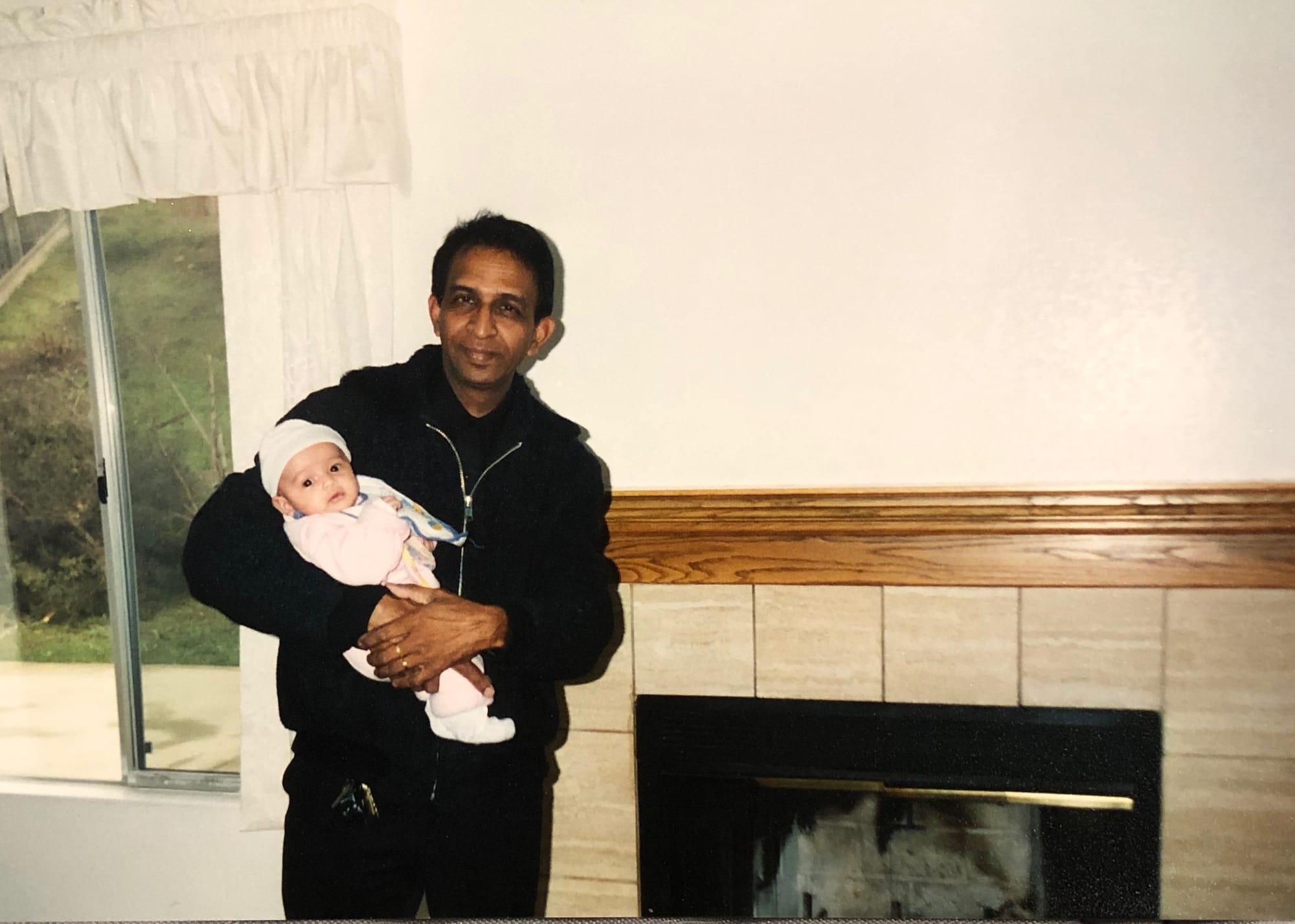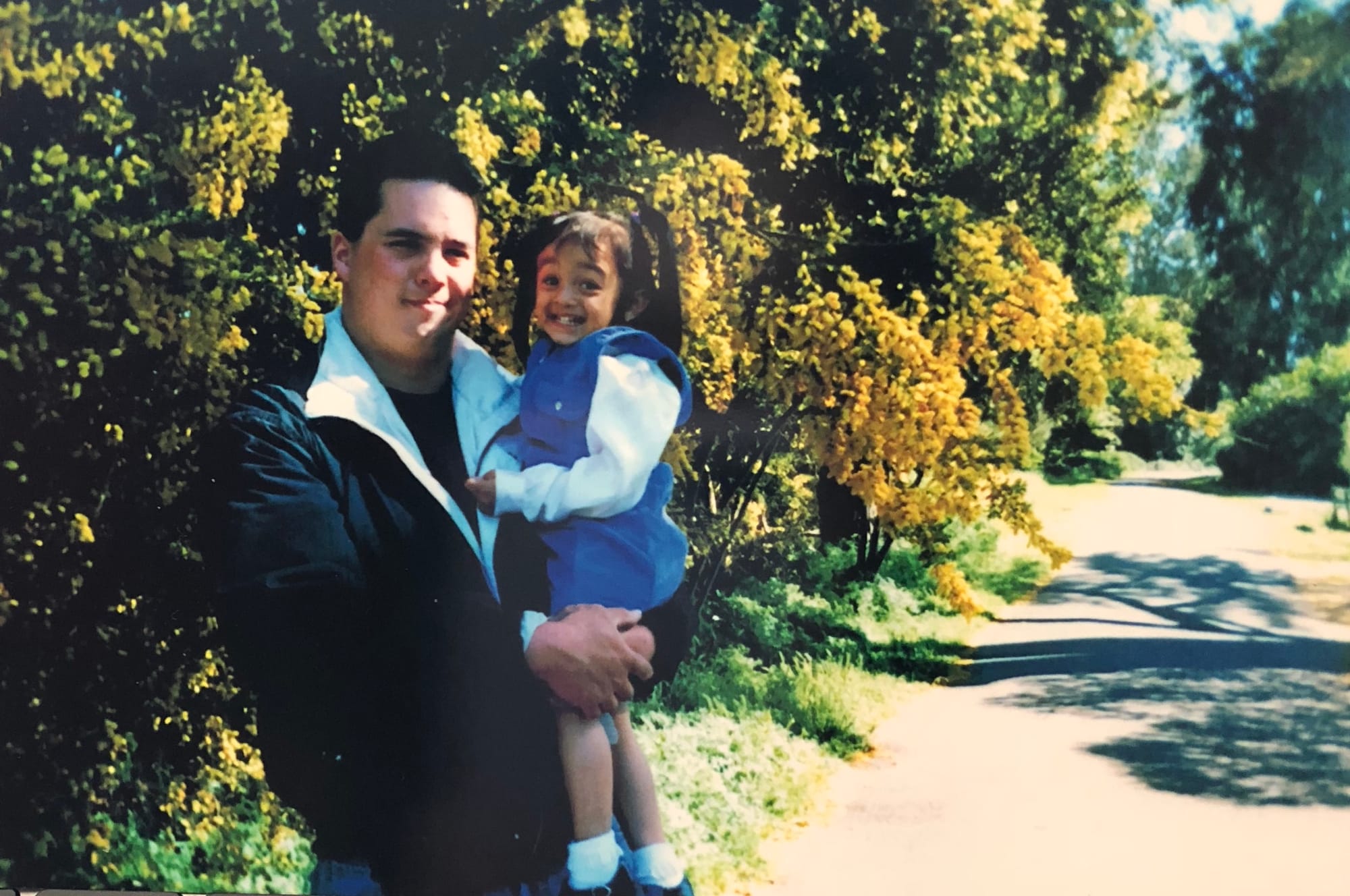Pigmentless Identity
Stripping Myself of Color
About Me
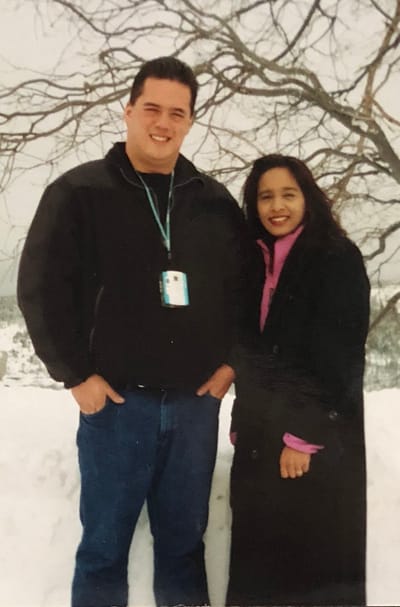
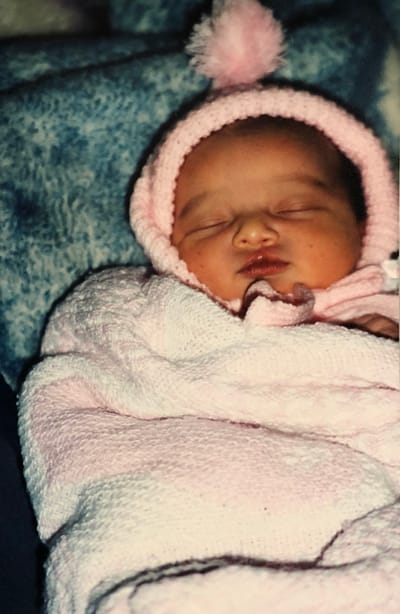
Religion
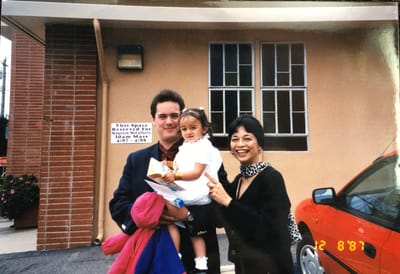
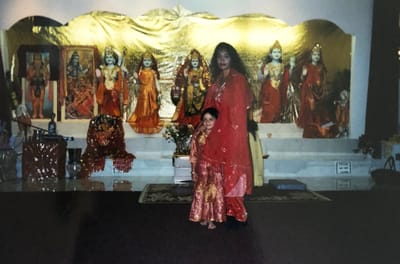
At the age of three, I was baptized at a Roman Catholic church. My dad and my grandma attended my baptism, but my mom did not. The few religious related memories about my dad are of every morning he would quietly say his prayers in the morning on the way to drop me off at school and my grandma giving me kids books about Catholicism. At the time, I didn't truly have a grasp of religion and the importance of it to them, maybe because I had conflicting religions in my life, and as the child, I was supposed to naturally obtain the same religion of each parent.
Throughout my childhood, and currently into my adult years, I attend pujas, which is prayer rituals performed by Hindus of devotional worship to one or more deities, or one to spiritually celebrate an event. It may honor or celebrate the presence of a special guest, or their memories after they die. Most people hold at least one puja at their house every year, meaning I have attended at least 35-40 in my lifetime. Aside from occasional occurrences, I was taught by my nani (grandmother on my mother's side) how to conduct morning prayers. Despite her participation in all other things religious, my mom did not conduct these daily prayers, however, we did have pictures of multiple gods framed throughout our house. Despite the constant influence of Hinduism in my life, I never understood the meaning of why we must do this in order to live a good life.
When I was in high school, Nani was diagnosed with breast cancer. From that day on, I had a completely different perspective of religion. The moment that my mom had found out about Nani's diagnoses, she not only lost her faith in God, but also had such an opposing view of it. My nani did survive, however, this did not change how my mom's perspective. She felt that if there was a God or gods, and there were lessons to be taught to the human race, he wouldn't hurt those who good people, yet struggled through hardships while devoting their lives to religion.
How did your childhood religious upbringing shape your beliefs as an adult?
Between being raised with two conflicting religions and the loss of my mom's religion, I have come to realize that it is my decision on what to believe in. I have developed more science-based beliefs. After learning about different religious ideologies, I do believe in the theory that our souls or spirits have a conscious and are energy that remains somewhere in our enviornment, for energy is not created nor destroyed. As for how many or what gods there are, I don't necessarily know if I believe in that at this point in time. As an adult, I have learned to respect all religions and more importantly to never tell anyone that their beliefs are wrong because can anyone truthfully say with indisputable fact that their religion is the one and only religion? My religion has no name, but focuses on moralistic values such as helping others.
Holidays
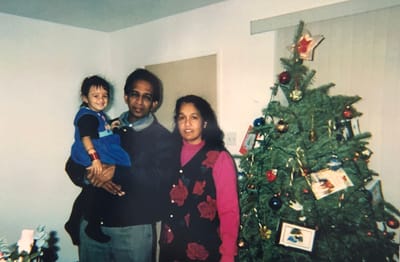
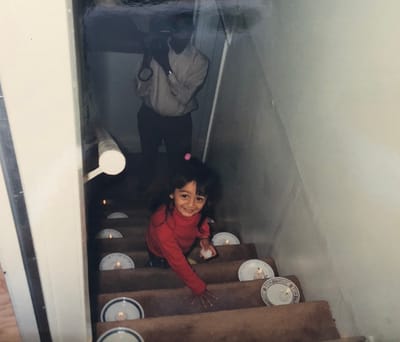
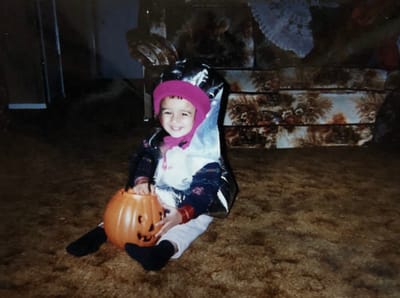
The two sides of my family were and continue to be very courteous of each other's views meaning that they did not necessarily have any opposition to me celebrating other holidays. Even though my mom's side of the family is Hindu, they have celebrated American holidays such as Christmas, Halloween and 4th of July since the day they emigrated from Fiji. In addition to these, they celebrate Indian holidays such as Diwali and Raksha Bandhan. Diwali is called the Festival of Lights and is celebrated to honor Rama-chandra, the seventh avatar (incarnation of the god Vishnu). It is believed that on this day Rama returned to his people after 14 years of exile during which he fought and won a battle against the demons and the demon king, Ravana. Raksha Bandhan is a festival which celebrates the bond of affection between brothers and sisters. It is a day when siblings pray for each others' well being and wish for each others' happiness and goodwill. Most Americans only consider other children of your parents your brothers and sisters while Indians consider ALL of your cousins as brothers and sisters as well.
Daily Life
Every day I dressed up in American clothes, went to school and ate American food. I spoke English, as it was my first language and had crushes just like any other little boy. I was no different on paper than any other girl my age. The only difference was when I went home from school, I would occasionally eat Indian food, and when I went to family parties, I would dress up in Indian outfits and when my family was over, I would translate conversations from Hindi to English for my dad. Although different from a white household, growing up in the Bay Area, I was surrounded by people of different ethnicities, meaning that many of those of kids I went to school with were doing the same thing. The only difference was it was tailored towards their religion or cultural background.
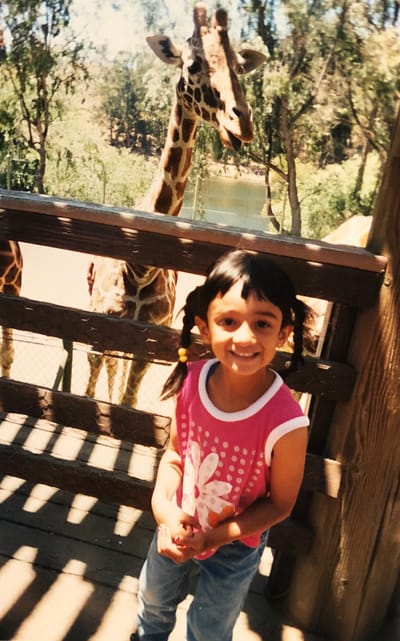
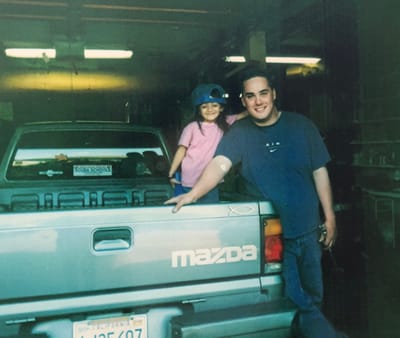
Family
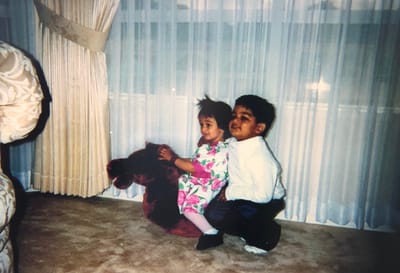
How did your family perceive you in relation to not being full Indian?
Although it sometimes is not verbally stated, I know that my family has different standards for me than they do for my family members my age who are 100% Indian. This difference can be percieved in some manners as a lower standard and others as a higher standard. For example, I have a cousin, Priya who is a year older than me, and this year we both are about to transfer out of community college. For her, our family sees her lack of motivation for a better life and less enthusiastic with her transfer. They say, "well I'm happy for her, we'll see how far she gets", yet I am the one who gets the whole, "Education is the most important thing in your life and no one can take your education away from you." speech. In addition to Priya, I have another cousin who is the same age as me and about 2 years ago, she announced that she got into UC Berkley. My family was not only not impressed, but they flat out thought she was lying. During a conversation between me and my aunt, she said, "If you were to tell me that you got in I would 100% believe you, but since she is saying it, I highly doubt that is true. I would need to see the paperwork to believe it." They are indirectly telling me that they expect more from me that I can go further in life and achieve more than her.
When it comes to the traditional roles of women in Indian culture such as cooking, my family now realizes that their expectations will not be achieved, but not for Priya. If she ever was to fail at completing those duties, it would be considered a disgrace to the family.
Last but not least, relationships. First, let me start off by telling you, my mom was the first, and the only person in our large immediate family to marry a non-Indian man. That did not go over very well, for my grandfather chased her with a machete when he found out. Thankfully, she broke the traditional marriage standard. I am very open about a lot to everyone, however, when it comes to my relationships, I am extremely private and don't share much if anything with my family. Despite this, everyone already expects me to marry a white man. With Priya on the other hand, just this last year they were considering an arranged marriage for her. Obviously, the standards between the two of us are far from similar.
The main difference between me and Priya are that I have become more "white-washed" or Americanized, while she holds more of our family's cultural heritage. This, in turn, increased their standards for success for me since I would be able to "fit in" and compete against other Americans for my American dream, while I am seen as a disappointment when it comes to preserving the traditional roles of women.
Discrimination
What areas of your personal life have you experienced hypo-decent and racialization? Do you feel that this was a reaction to your skin color, religion or the fact that you are biracial?
Despite the fact that I am half white and half Indian, I get acknowledged as Indian when in public, but when I am with family I get labeled as the white one, not based off skin color but simply because I am not 100% Indian.
When I introduce myself to customers at work and say “Hi my name is Sarika”, they almost instinctively feel the need to look down at my name tag because I am brown and don’t have a simple American name such as Susan or Emma.
This makes me feel as though they are automatically perceiving me as “not like them” and are subconsciously placing me in a particular group, even if they have the purest intentions. My usual response is “Don’t worry, my middle name is Elizabeth and my last name is Robinson, it’s not that hard, I promise”. My response comes from an internal urge that makes me feel the need to prove to them I am “American” or non-ethnic just like them. (We are located in Burlingame, therefore a lot of our customers are all white families from Hillsborough and Burlingame) Ultimately, this makes me feel embarrassed to be anything other than white, blonde hair and light eyed. At this point, I can only hope that they don't treat me any different they would a white girl with the same personality.
Is the type or extent of discrimination dependant on your environment?
When I am in public, at least in the Bay Area, people feel the need to be politically correct, therefore usually don't say anything that would come off as blatantly racist or rude, however, their opinions are still subtly infused into their words or their actions. This pressure of feeling they need to be politically correct subconsciously forces them to look at my name tag and say "Oh that is such a "unique" name! I love that."
On the other hand, when I am with my family, they are relatively upfront about it. They feel that since we are family they should speak their mind and not be "fake". A lot of times when we are out in public, my aunts will make comments about other people saying, "well they're white people, they're going to be dirty" or "that's what white people do, don't be surprised." Despite knowing that I identify with my white side and that they identify me as white, they still make these comments unafraid of how I might feel.
How have these experiences altered how you perceive yourself?
Ever since I can remember, I have never identified with my Indian side. There is a specific quote that I used to say, “I want to be plain like daddy.” This represents my genuine feelings about myself to this day. My conscious feels as though I don’t belong in my body in a way. In every way shape and form I feel as though I am a white skinned being, but as my hands come into view, it is a constant reminder that I can not change what race or skin color I was born. Despite this hatred towards myself, I have very strict and high moralistic views on the way I and every person should treat others. I believe in the idea that one should be judged on their actions and decisions rather than preconceived judgments made by others, prejudice and stereotypes.
Since my "race" alternates depending on my environment, I am never labeled as the dominant group. All I am every labeled as is "the black sheep". This ultimately makes me feel that I will never be able to fit in. Although I have not come to accept my ethnicity as who I identify with, I feel that my experiences have allowed me to realize that I, as a human being, have the ability to stand out amongst the 325.7 million people that live in the United States. Now that is pretty powerful if I am looking to create change in this world.
From your experience, do you see a change in the racial formation in the United States? If not, why? If you do see a change what are the circumstances you attribute that to?
Yes, over time what is considered to be “white” has significantly absorbed many other races. I believe this is due to the blending of races. More and more families are multiracial meaning that it is becoming harder and less relevant to label and divide these races as either one or another. Despite this, I feel that there has been little change in societal partaking in racial formation in the United States. I can not speak for other states or even other parts of California that I have not been, but I feel as though the little change that has happened over my little over two decades of life was simply a manifestation of the current ideas. Even though people don’t intentionally discriminate against me, people psychologically place me into categories or associate me with ethnic I do not identify with.
"We’re all a little racist"
Merriam-Webster’s dictionary defines racism as "a belief that race is the primary determinant of human traits and capacities and that racial differences produce an inherent superiority of a particular race” while defines prejudice as "a preconceived opinion that is not based on reason or actual experience."
So is he really racist, or is he just prejudice? I believe that his ideas are prejudice. Racism is a form of discrimination that solely focuses on a race or ethnicity of a person or group of people. More importantly, he never acts upon this belief. He has never gone out of his way to treat, disrespect or harm another being based on this prejudice. He was raised me to treat everyone the same respect and kindness that I would want to be treated with. Personally, I believe this disqualifies him as a racist. This idea that he possesses stems from his personal experiences as a child. When he was in elementary school, he got picked on and beat up walking home from school frequently. One time they beat him up so bad that they split open his head. As a result, he developed the belief that everyone has the ability to do harm, and if these kids were inflicting harm for no reason, people, regardless of age, who have a motive, will without a doubt take the chance to hurt you, so you must be prepared. He is a very kind-hearted person with good intentions, but when he feels threatened, he will protect himself.
Cycle of Socialization
Outside of the household, there is a very prominent idea in my family’s religion of Hinduism that the female’s main role is to take care of the men. Even in our Americanized family that emigrated from Fiji, if you attend even one house party, you will see very quickly and clearly the roles that everyone plays. For example, usually, the men all sit around the pool table talking about whatever is going on in their life like their jobs or medical problems, while the women are consistently in the kitchen either preparing setting up or packing up the food. There is almost no time during the party they simply relaxing and sitting down. When it’s time to eat, the men continue to sit while the women take out food for the men and serve them. I feel that this is a large contribution to why I have such a hate when I am associated as Indian because this idea is something I am heavily against. If I am forced to bring food to the elder men, I feel so out of place and uncomfortable even though I grew up in that role.
Deeply ingrained in me from my mom is the idea that no one will ever stop me from doing anything I want to do. So every time I get a gut feeling that a new Indian family member I meet, or any person for that matter, assume I am someone who passively sits there and lets anyone, regardless of what sex they are, have any control over me, I make it very clear that no one controls me. I make my own decisions and no one tells me what to do. I may take someone's advice, or do something for another person out of kindness, but it is my decision to do so. Even if I run the risk of coming off as a spoiled brat, I feel there is no option. I must show that I am not like the others.
As it states in the diagram from the Cycle of Socialization article, often as a result of the first socialization in combination with institutional and cultural socialization, one can feel self-hatred. I definitely identify with this idea every single day of my life from the moment that I wake up to the second I go to sleep. It’s not an “I hate my life” self-hate. It's an "I hate who I was born" self-hate. As I speak to myself in my head and even out loud, I perceive myself to be white, but the second my hands come into view and I see the tan complexion of my skin I automatically feel disappointed. In all honesty, I have tried everything from exfoliating my skin once a day to lightning lotions and soaps that would chemically burn my skin leaving scabs on my face.
Dating back in History
I feel that my experience of race is very much different for the reason that growing up in the most diverse bubble in the United States has allowed me the privilege of not facing much discrimination. For the most part, I haven’t had any experiences of people being blatantly rude to my face or verbally identifying me with stereotypes unlike those who fought for our freedom. Despite this, there are some similarities in regards to the emotions tied to being a colored person in the United States, particularly in 2018.
Feeling particularly isolated and abused, non-Americans joined together to form Barrios and Mutualistas. These were groups formed in order to survive the marginalization and exploitation. Barrios were communities comprised of and created by Mexican-Americans in the territories acquired by the United States in the Treaty of Guadalupe Hidalgo in the second half of the 19th century. Mutualistas were organizations formed by African-Americans in the 19th century to provide essential economic and social services, such as health and life insurance, funeral services, and cultural entertainment. These groups helped them survive by allowing for Collaboration meaning they were not struggling alone. Additionally, this allowed for the support of each other. An example of this was the creation of businesses where they would buy and sell from each other. As a result, they shared financial resources, child care support, food, education and were able to prevent their culture from being taken away and Americanized through continuous cultural events.
Although I may not be able to relate to the same level of intensity as these two groups, I can relate with the idea that in order to succeed you must support each other. Coming to the United States, my grandmother and her siblings all immigrated one by one struggling to survive. With little money, they shared groceries, reused everything from cloth diapers to tin foil and would watch each other's children while they would go to work. Although this was not my personal experience, I will never forget the struggle my grandparents went through in order to give me a chance at living a better life and experiencing the American dream. Those are the same communitive ideologies that are instilled in me today. Additionally, ingrained in me is the idea that you should always help others. Between both my parents, my mom instilled this more communicative idea while my dad heavily believes in the idea that you have to deal with your one problems and you can’t rely on others. My family continues to celebrate the same holidays and prayer ceremonies that they would, living in Fiji, preserving their cultural heritage just as the Mexican and African Americans did during the 19th century. Mexican and African Americans have been facing this fight a lot longer than other cultures yet, and unlike many others, they continue to keep their identities intact. In other cultures, many people lose their ability to speak their ethnic language over the course of 1 to 2 generations, simply because they assimilated to American culture, losing their cultural roots like me.
Aside from cultural values, Mexican Americans felt the need to assimilate, despite the fact that they were born in America and felt that this was just as much their home as anyone else's. I may not have experienced quite the heavy pressure that Mexican Americans did, but I still feel that in order to utilize my potential to the best of my abilities, I must present myself as being the least "ethnic" as I can. Today's society is pressured to become more diverse and inclusive, however, I feel that features that look good on paper are all that really matter. My tan skin qualifies me as being ethnically diverse, but I feel in order to move up into higher positions you must attain specific qualities which are found in American culture rather than ethnic ones.
My Mom’s Experience
What type of religious influences did you have during your childhood and how did that shape your beliefs as a child and as an adult?
“I was raised Hindu, but when I was two, [my parents] put me in a Catholic preschool. One day, I brought home a plastic crucifix that they handed out and brought one to my Nani, (her grandmother) and she was like “NOOOOOOOOOO”. Nani (her mother) always taught me not to do things simply because someone tells you to. [As a result,] I grew up questioning everything including religion, and she got annoyed with me asking well “why do we do this?” and “why don’t they do this in school?” Realizing that they have such different thought processes, religion became something I thought I just had to do. Once I started questioning everything, and I didn’t like the answers, I realized that religion is not for me. [Despite this,] I tried, I tried very hard. I attended pujas and even did the whole no beef in the house when we move into our own place, but for what? My experiences overall made me indifferent because no one could explain why we had to do these specific things, and the things we were doing made no sense, but what tipped it over was when Nani got cancer. I threw everything out."
What religious holidays did you celebrate?
“We celebrated all the regular holidays like Christmas and Easter, but not for Jesus Christ. We celebrated because we got presents and candy.”
What was your daily life like in relation to other kids your age?
“[There was] nothing different. I dressed like any other kid, went home, ate ice cream, talked on the phone. There was nothing in particular that was different about me. I had a normal childhood.”
What discrimination did you face in during your life? Do you feel that this discrimination was more tailored to your skin color or religion?
“Well I attended Terranova High School for the first 3 days and there were 3 minorities there in the whole school and when I was crying, begging Nana not to take me, the principal asked me “Is the reason that you want to go to Oceana is because your skin color is so much darker than everyone else’s?” [In addition to this] I would sit on the portable stairs crying by myself waiting for class because everyone just shunned me. I couldn’t take rejection like that. So to answer your question it could’ve been a mixture of both but the main factor that made me stand out was my skin color.”
Is the type or extent of discrimination dependant on your environment?
"Yes. We live in such a bubble in the Bay Area, but when I went to Iowa to help move your dad into his apartment down there, it was obvious that not only were colored people rare to see out there, but a mixed color was uncalled for. It’s almost like we went back in time simply by crossing state lines."
How have these experiences altered how you perceive yourself?
"Although I have received little discrimination due to where we live, my experiences have made me more proud to be Indian."
From your experience, do you see a change in the racial formation in the United States? If not, why? If you do see a change what are the circumstances you attribute that to?
"I think we are all going to be beige one day and I think that part of the divisive rhetoric that you hear is people feeling threatened because they know it’s coming and it’s more in your face, not to mention we have a president that normalizes being racist. A few years before I was born, it was illegal for me and your dad to get married. We were heading in the direction of positive change, but with them rolling back LGBT rights, women’s rights, our reproductive rights, we are sliding back and I think it will get worse because this administration is putting very conservative judges that are going to be there for life, making judgment calls on laws meaning that we will most likely slide back more. Even if [Trump] doesn’t get re-elected, he’s already done so much damage."
cultural Experience over the generations
Aside from this interview, we both participated in a family tree activity where were created a list of the main people that raised us and completed a profile of each person containing their race or ethnicity, gender, sexuality, educational level, religion, marital status, economic class and place of birth. We then used this to create a list of core values we associate with ourselves, and determine whether we feel that we have a traditional or untraditional family.
From this activity, I found that many of the profiles of those who raised us were the same and our core values by which we associate ourselves with were nearly identical. She had put that we have a traditional family, while I wasn't quite sure what to put because what defines what a traditional family is? There are many different definitions of what traditional is, and I don't see myself ever fitting into what traditional actually is. Functioning, yes but I think every family has its own traditions that make them unique.
The core values that both my mom and I wrote down were
1. work hard in everything you do
2. do better than the generation before you
3. family first
4. help each other
5. always treat others with kind and respect
I have come to learn that it takes time for one to define their identity simply because it is continuously changing. Throughout your life, you are experiencing new environmental influences that morph and shape your perspective on everything from humanity to the way you look at yourself. Often you can look at your parents to see a glimpse of what you might become because they are a huge part of your everchanging environment and often absorb similar qualities.
